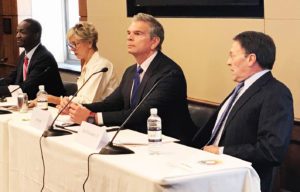Creative, AEI & former OPIC head discuss the future of development in Africa
By Evelyn RupertJune 29, 2017
Proposed cuts in aid to Africa would weaken U.S. influence and set back advances on the continent, but there is room for reform in development, panelists said on Capitol Hill.
The White House’s proposed budget reductions to economic, health, education and peacekeeping will have a profound impact on the Africa’s future, said Earl Gast, Creative Associates International’s Senior Vice President and Senior Director of the Education for Development and Economic Growth Divisions.
Gast participated in a three-person panel discussion hosted by the Brookings Institution on June 26 that centered on how evolving U.S. diplomacy and foreign assistance budgets will affect Africa.

The proposed federal budget calls for more money on military affairs in Africa, but a reduction in humanitarian and development funding, from the current $8 billion to $5.2 billion in the 2018 fiscal year.
“The budget is sending the signal that we’re moving away from engagement in Africa, with African institutions, with African leaders and also that we don’t see Africa as an opportunity for economic investment,” said Gast, who was Assistant Administrator for the U.S. Agency for International Development’s Africa Bureau. He retired from USAID in 2014 after more than 20 years of service.
International development initiatives have helped African nations make significant improvements in education, infrastructure, health and more.
The U.S. has committed billions of dollars to combatting HIV/AIDS – particularly through the President’s Emergency Plan for AIDS Relief (PEPFAR). Since PEPFAR’s launch in 2003 under President George W. Bush, the prevalence of HIV has declined in key countries, including by 34 percent in Malawi. There has also been a 60 percent decline in new HIV infections among children in sub-Saharan Africa since 2009.
The budget proposal would slash programs that buy antiretroviral drugs for those with HIV by nearly a fifth, or $1.1 billion.
Creative is currently implementing several projects in Africa with a focus on peacebuilding, early grade reading and education in conflict, such as Nigeria Education Crisis Response, which seeks to expand access and quality of education children displaced by Boko Haram. Many such projects are funded by the U.S. Agency for International Development.
Gast said particularly worrisome are proposed reductions in humanitarian assistance, peacekeeping operations, agriculture and food security programs like Feed the Future, and economic growth and education projects such as Power Africa and the Young African Leaders Initiative. In addition, U.S. development assistance funding to 12 African countries would be cut entirely.
He added that based on the budget proposal, efforts appear to be shifting to countries with the most serious security situations and turning away from nations that are progressing in the right direction, such as Zambia and Mozambique.
But Gast argued that place-based development projects can contribute to reduced violence and improved security.
“Development programs can help … get at the community-level tensions, which is where violence occurs. And it’s reaching out to church groups, other social groups, educators, leaders, and educating them on conflict resolution,” he said. “It has to take place at the local level.”
Room for reform
“The budget is sending the signal that we’re moving away from engagement in Africa, with African institutions, with African leaders and also that we don’t see Africa as an opportunity for economic investment.”
Though the proposed budget cuts are cause for concern for African development, said Gast, the budget proposal and talk of restructuring also gives lawmakers and stakeholders a chance to make positive changes.
“I do think that there is an opportunity for reform,” he said.
He added that starting off development programs with solid and sustainable plans, while also allowing for flexibility as they progress, is key.
“Project design is absolutely critical to getting the project right at the very beginning, and also recognizing that along the life cycle of a project there are externalities that are going to require the project to take a different direction,” he said.
Panelist Danielle Pletka, Senior Vice President for Foreign and Defense Policy Studies at the American Enterprise Institute, argued that the door has to be open to examining the efficiency, effectiveness and sustainability of U.S. foreign aid programs.
She said that, in her assessment, the administration’s proposed budget does not outline a coherent strategy toward Africa, and called for a new underlying philosophy toward development.
“The right thing is to bring a new and different philosophy, whether you’re from the left or from the right, and then design what the programs ought to be around that, and legislate around that,” she said.
“We need to recognize the failures that have come before us, understand why those failures are in place, because otherwise we are not going to win at making the case that we need to remain engaged.”
Leveraging the private sector
All three panelists agreed that harnessing the power of the private sector is essential for sustainable economic growth.
Rob Mosbacher Jr., former CEO of the Overseas Private Investment Corporation, said he’s seen a shift in development toward smaller-scale and more local economic growth.
“I think a better strategy, which is evolving, is a strategy in which we encourage more economic activity, not big projects that are very difficult, but economic activity that’s more focused on microfinance, on small- and medium-sized business, access to credit. On things that can help businesses that are there, not foreign direct investment,” he argued.
Gast added that he has seen promising signs of increased private sector development in Africa, but that there is still a need for government aid.
“In the absence of private sector investment, in critical areas like education and health, that’s where public assistance comes in, and we shouldn’t understate the importance that it plays,” he said.

